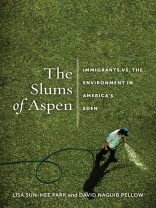Winner, Allan Schnaiberg Outstanding Publication Award, presented by the Environment & Technology section of the American Sociological Association
How the elite ski resort reshaped the socio-economic and demographic landscape in pursuit of profit and pleasure
Environmentalism usually calls to mind images of peace and serenity, a oneness with nature, and a shared sense of responsibility. But one town in Colorado, under the guise of environmental protection, passed a resolution limiting immigration, bolstering the privilege of the wealthy and scapegoating Latin American newcomers for the area’s current and future ecological problems. This might have escaped attention save for the fact that this wasn’t some rinky-dink backwater. It was Aspen, Colorado, playground of the rich and famous and the West’s most elite ski town.
Tracking the lives of immigrant laborers through several years of exhaustive fieldwork and archival digging, The Slums of Aspen tells a story that brings together some of the most pressing social problems of the day: environmental crises, immigration, and social inequality. Park and Pellow demonstrate how these issues are intertwined in the everyday experiences of people who work and live in this wealthy tourist community.
Offering a new understanding of a little known class of the super-elite, of low-wage immigrants (mostly from Latin America) who have become the foundation for service and leisure in this famous resort, and of the recent history of the ski industry, Park and Pellow expose the ways in which Colorado boosters have reshaped the landscape and altered ecosystems in pursuit of profit and pleasure. Of even greater urgency, they frame how environmental degradation and immigration reform have become inextricably linked in many regions of the American West, a dynamic that interferes with the efforts of valorous environmental causes, often turning away from conservation and toward insidious racial privilege.
Sobre o autor
David N. Pellow is the Dehlsen Chair of Environmental Studies at the University of California, Santa Barbara. His teaching and research focus on environmental and ecological justice in the U.S. and globally.












